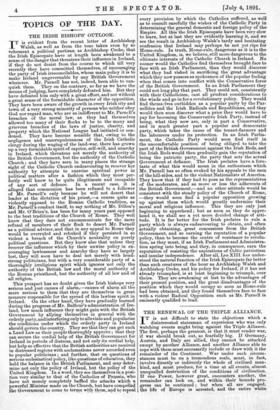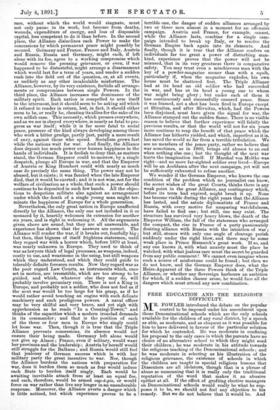THE RENEWAL OF THE TRIPLE ALLIANCE.
IT is not difficult to state the objections which a, disinterested statesman of experience who was only watching events might bring against the Triple Alliance_ The first, perhaps the greatest, is that it must render war, if war should break out, so fearfully big. If Germany, Austria, and Italy are allied, they cannot be attacked except by another Alliance, and another Alliance able to cope with them must necessarily include or draw with it the remainder of the Continent. War under such circum- stances must be on a tremendous scale, must, in fact, involve directly or indirectly the whole of civilised man- kind, and must produce, for a time at all events, almost unequalled destruction of the conditions of civilisation. If one Power, however great, encounters another, the remainder can look on, and within ,their bounds pro- gress can be continued ; but when all are engaged, the life of Europe is arrested, and the entire white race, without which the world would stagnate, must not only pause in its work, but become from deaths, wounds, expenditure of energy, and loss of disposable capital, less competent to do it than before. In the second place, the Alliance disinclines each Power to make the concessions by which permanent peace might possibly be secured. Germany and France, France and Italy, Austria and Russia, Russia and Germany, might each, if left alone with its foe, agree to a working compromise which would remove the pressing grievance, or even, if war happened to be distasteful, might arrange a disarmament which would last for a term of years, and render a sudden rush into the field out of the question, or, at all events, as unlikely as any other incalculable misfortune. The Alliance, however, by its very existence, forbids all arrange- ments or compromises between single Powers. In the third place, the Affiance increases the dominance of the military spirit. Each nation is compelled to arm itself to the uttermost, lest it should seem to be asking aid which it refused to render in return, lest, in fact, it should either seem to be, or really be, cheating its allies for the sake of its own selfish ease. This necessity, which presses everywhere, and as we see is obeyed everywhere, is nearly as fatal to pro- gress as war itself; while it is far more fatal to social peace, pressure of the kind always developing among those who work a bitter grudge, partly just, partly a mere result of envy, against those who spend. Socialism grows fast while the nations wait for war. And finally, the Alliance does deposit too much power over human happiness in the hands of individuals. It is foolish to deny that, as matters stand, the German Emperor could to-morrow, by a single despatch, plunge all Europe in war, and that the Emperor of Austria or King Humbert could with nearly as much ease do precisely the same thing. The power may not be abused, but it exists; was fancied when the late Emperor died, that it would be exerted ; and it is not wise, not for the welfare of civilisation as a whole, that such a power should continue to be deposited in such few hands. All the objec- tions to despotism militate also against an arrangement under which the death of a single young man might ter- minate the happiness of Europe for a whole generation. Nevertheless, the only great nation in Europe unaffected directly by the Alliance, the only one not included in it or menaced by it, heartily welcomes its extension for another six years, and is right in welcoming it. All the arguments given above are sound, but they are all answerable, and experience has shown that the answers are correct. The Alliance will render the war, if it breaks out, fearfully big ; but then, that bigness of itself frightens statesmen, until they regard war with a horror which, before 1870 at least, was nearly unknown in Europe. They used to think of war as lawyers think of legal processes, as weapons, indeed, costly to use, and wearisome in the using, but still weapons which they understood, and which they could guide to tolerably definite foreseen results. Now they regard war as the poor regard Law Courts, as instruments which, once set in motion, are • irresistible, which are too strong to be guided, and which, whatever else they may do, will probably involve pecuniary ruin. There is not a King in Europe, and probably not a soldier, who does not feel as if the next war would be too large for his grasp, as if he would rather avoid touching an engine with such delicate machinery and such prodigious powers. A naval officer may be very skilful and very brave, and yet sigh with apprehension as he reads " In a Conning-Tower," and thinks of the capacities which a modern ironclad demands in its commander; and that is the position of each of the three or four men in Europe who singly could let loose war. Then, though it is true that the Triple Alliance prevents concessions, its absence would not ensure their being made. Germany left alone would not give up Alsace ; France, even if solitary, would want her provinces and the leadership ; Austria by herself would still struggle for the Balkans ; and Russia would still feel that jealousy of German success which is with her military party the great incentive to war. Nor, though the Alliance burdens the nations with preparation for war, does it burden them so much as fear would induce each State to burden itself singly. Each would be awaiting inevitable attack from at least an equal foe, and each, therefore, would be armed cap-a-pie, or would force on war rather than live any longer in an unendurable suspense. Moreover, the Alliance averts a danger which is little noticed, but which' experience proves to be a terrible one, the danger of sudden alliances arranged by two or three men almost in a moment for an offensive campaign. Austria and France, for example, cannot, while the Alliance lasts, combine for a single cam- paign intended to break up Italy, or to resolve the German Empire back again into its elements. And finally, though it is true that the Alliance confers on individuals far too great a power of disturbing man- kind, experience proves that the power will not be misused, that in its very greatness there is comparative safety. You may trust even a mischievous man with the key of a powder-magazine sooner than with a squib, particularly if, when the magazine explodes, his own house must be shattered first. The Triple Alliance had at its head an old soldier who had succeeded in war, and has at its head a young one to whom war might bring glory ; but under each of them it has continuously and successfully ensured peace. Since it was framed, not a shot has been fired in Europe except at Slivnitza, and after Slivnitza, which, had the Powers been disjoined, must have given the signal for war, the Alliance stamped out the sudden flame. There is no visible reason to believe that further experience will falsify the previous results, or that the world will not for six years more continue to reap the benefit of that peace which the Alliance has hitherto yielded, and which, imperfect as it is, has saved the world so far from a terrible tribulation. We are no members of the peace party, rather we believe that war sometimes, as in 1860, brings old abuses to an end when nothing else can ; but the thought of the next war hurts the imagination itself. If Marshal von Moltke was right—and no more far-sighted soldier ever lived—Europe will be an Aceldama after the next campaign, yet will not be sufficiently exhausted to refuse another.
We wonder if the German Emperor, who knows the one condition of the problem which no journalist can know, the secret wishes of the great Courts, thinks there is any weak point in the great Alliance, any contingency which, before its term had expired, might break it up. None has become visible during the eight years that the Alliance has lasted, and the astute diplomatists of France and Russia, with every motive for unsparing watchfulness, have failed to find one ; but still, one may exist. The structure has survived very heavy blows, the death of the Emperor William, the fall of the statesman who arranged the compact, the rise in France of a party passionately desiring alliance with Russia with the intention of war ; but still, stones with only one angle of cleavage perish suddenly under the right blow, and there may be some weak place iu Prince Bismarck's great work. If so, and any one knows it, with what anxiety must the place be watched, with what jealous care must the secret be guarded from any public comment ! We cannot even imagine where such a source of misfortune could be found ; but then we do not know, and the German Emperor does, what the Heirs-Apparent of the three Powers think of the Triple Alliance, or whether any Sovereign harbours an ambition for which, if a sudden chance arose, he would face all the dangers which must attend any new combination.











































 Previous page
Previous page